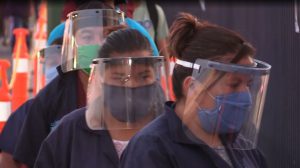The local news channel 23, Valley Central in Rio Grande, Texas, wrote about the Border industry and its effects from COVID-19. Our guest speakers from our SCI Global Conversation: U.S.-Mexico Trade During COVID-19 were featured on this news article. The speakers were Alan Russell, CEO of Tecma, Paola Avila, vice president for international business at the San Diego Regional Chamber of Commerce, and David Coronado, director of international brudges for the City of El Paso.
Read below or click this link here to find the article on the website.
U.S.-run factories in Mexico back at full strength after applying COVID-19 Protocols
EL PASO, Texas (Border Report) – Border industry is poised for explosive growth in the next few years, as companies take heed of lessons learned in the COVID-19 pandemic and relocate more production to North America, trade experts say.
Many U.S. manufacturers who get supplies from China experienced delays during the pandemic, which added to brewing concerns over already tense trade relations between both countries.
“We have a huge number of U.S. companies doing business with China. […] Any number of consumer goods come from China but all those companies are coming under the realization that there is trade tensions that are going to continue regardless of who wins the (U.S. presidential) election,” said Alan Russell, CEO and co-founder of Tecma Group, which runs 50 manufacturing facilities in Mexico and the U.S.
The specter of trade tariffs or another pandemic cutting into Asia-based production is making many manufacturers who sell parts, materials or goods in the United States consider moving at least some of their operations closer to their target market, he and others say.
“So, if you are going to supply North America with a product, you need to have a significant portion of your production in North America,” Russell said. “And where are you going to go? You are going to go to a border city. So, for the next three to five years, I unconditionally see an unprecedented growth in opportunity at these border zones.”

Russell spoke Wednesday at a virtual U.S.-Mexico trade forum sponsored by Sister Cities International. Experts from both sides of the border say the economic recovery in the manufacturing sector amid the COVID-19 pandemic has been surprisingly swift.
“We share much more with Mexico than just a border. We share economy, workforce, consumer markets, and integrated supply chains,” said Paola Avila, vice president for international business at the San Diego Regional Chamber of Commerce. “The recovery is also interdependent. Supply chains have really shown their strength. (Manufacturing) is bouncing back.”
Cities like San Diego, where thousands of trucks carrying components and goods manufactured in Tijuana cross into the United States, and El Paso, which shares a border with Juarez and its 300 or so U.S.-run factories, are riding the coattails of this industrial recovery.
“We have seen what appears to be a V-shaped recovery, which is quite shocking,” said David Coronado, director of international bridges for the City of El Paso. “We were expecting a slow recovery. When you look back at the Great Recession, we had a long downturn and a long recovery. Here it’s been month-to-month … a really fast recovery and positive signs for the region.”
In El Paso, commercial traffic is approaching pre-coronavirus levels. “We hit bottom in April. Since then, we’ve seen a recovery in cargo truck traffic but we’re still not back to normal,” Coronado said.
Maquiladoras leading the recovery
The key to the border’s quick industrial turnaround lies in keeping going the U.S.-run plants in Mexico that employ hundreds of thousands of workers.
“We are back to 110% from where we were before the COVID outbreak. It’s an amazing recovery that you could never guess or expect, but we’re back to 100% of our full complement,” Russell said.
The Mexican government curtailed economic activity in the spring to contain the pandemic. However, maquiladoras that make auto parts, medical equipment or aerospace components — which together account for most of the production in Juarez — were labeled as essential businesses and resumed most of their operations on June 1.
A few COVID-19 outbreaks were reported, and in Juarez at least 25 workers died. However, Russell said health issues have been resolved and production is on high gear.
“We’ve gone three months without a single case,” he said. “We have factories with 11,000 people and we have a total of 20 suspicious cases in Tijuana and 24 in Juarez. What we call a suspicious case is someone getting off a bus or coming into the factory and having a high temperature.”
Russell said he’s sensitive to the pandemic because he came down with COVID-19 himself back in March.
“We treat vulnerables in a different way. Most are still at home and we continue to pay them, provide them health education and all,” he said. “We are passionate in our way forward with (COVID-19) protocols and protecting our vulnerable. Everybody else gets back to work. […] I feel with the protocols we have proven we can go back to work full steam ahead.”

